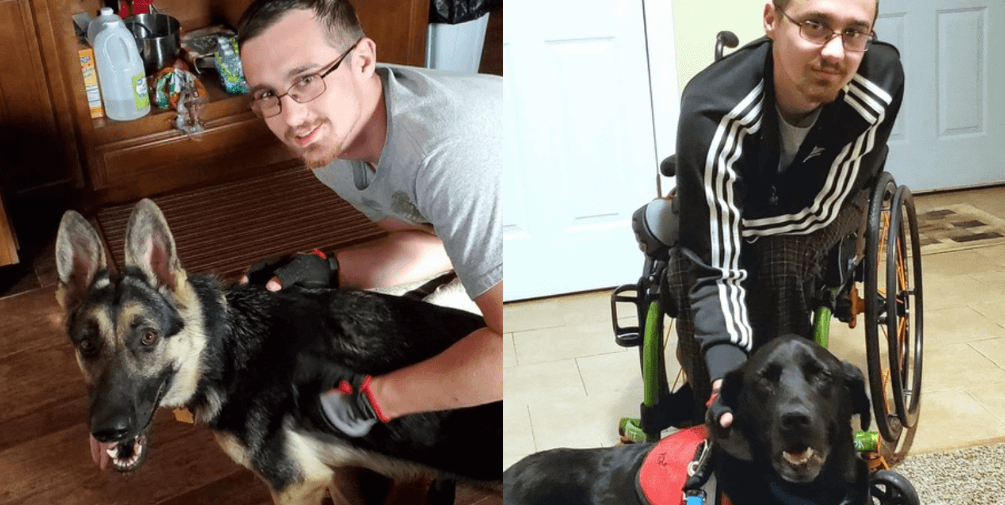A Wounded Warrior is reunited with his dogs, aiding his recovery
Airman First Class Brandon Piper joined the Air Force because, in his words, he was “going nowhere.” Homeless when he enlisted, A1C Piper decided that the Air Force could change his life while letting him serve his country as both of his grandfathers did before him.
In spring 2019, shortly before his third anniversary in the Air Force, A1C Piper’s life changed forever after an injury left him permanently paralyzed from the waist down. Stationed at Joint Base Lewis-McChord in Washington when the injury happened, A1C Piper went to a rehab facility in Minneapolis before he and his wife moved back home to Indiana.
While A1C Piper had a difficult recovery ahead of him, it was made more stressful because the couple had to leave their two dogs behind in Washington. The dogs stayed in boarding until the Pipers could figure out how to bring Echo and Hunter to Indiana – they were too big to fly, and a transport service would cost thousands of dollars.
A1C Piper’s lieutenant went to the Air & Space Forces Aid Society (AFAS) to see if they could help. While AFAS is able to support its Air Force family in many ways, sometimes they can’t provide direct support to an Airman. When this happens, they try to partner with other organizations who can provide the needed assistance.
Cathy Lutter, a Software Tester at AFAS headquarters, overheard a caseworker discussing how the Society could help this Wounded Warrior with his transport needs. Cathy told the caseworker that she had a friend who volunteers for an animal transport organization, Kindred Hearts, based in Wyoming. “They’re a great organization, and they provide a wonderful service!” says Cathy.
AFAS reached out to Kindred Hearts, and the plans to reunite Echo and Hunter with their family began.
Susan Goodnow, the Kindred Hearts Transport Coordinator, found a local foster family to take the two dogs so that the Pipers no longer had to pay for boarding. Susan then asked for volunteers to help drive the dogs from Washington to Indiana. “Using Kindred Hearts doesn’t cost a thing,” Susan explains. They even pay for harnesses, leashes and food.
Animal transports of this length rely on people to drive a leg that can be up to 100 miles in distance. They’ll meet the next volunteer at a designated spot, pass the animals on, and that person continues the relay.
Because of their size, Echo and Hunter had to be moved separately. That meant two near-cross country road trips driving through Washington, Idaho, Wyoming, Nebraska and Illinois before reaching Indiana.
A1C Piper had been severely depressed after his injury, but things changed once Echo and Hunter made it home. His wife and family noticed an almost immediate difference once Echo and Hunter arrived. “Everyone in my family noticed improvements with my mental health,” he recalls. A1C Piper credits his recovery to the dogs, not knowing how he would have gotten through it without them.
“It takes someone with a big heart and a lot of care for service members and veterans to volunteer to do this,” he says to the Kindred Heart volunteers. “I personally can’t thank them enough for helping me.”
Hunter has passed on since his return home, but the Pipers cherished their time with him. A1C Piper says Echo now keeps up his physical strength as he begins a new chapter in his life with his wife and young child.
Incorporated in 1942, the Air & Space Forces Aid Society (AFAS) continues to meet the unique needs of Airmen and Guardians. AFAS works to support and enhance the U.S. Air Force and U.S. Space Force missions by providing emergency financial assistance, educational support, and community programs to Air Force and Space Force families. In 2021, AFAS provided over $13.5 million in assistance to more than 19,000 Air Force and Space Force families. Visit www.afas.org to learn more, apply for assistance, or to donate.

